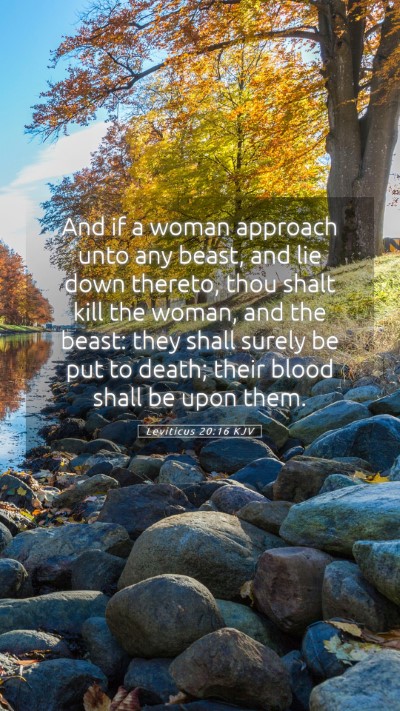Understanding Leviticus 20:16: An In-Depth Commentary
Leviticus 20:16 states, "If a woman approaches any animal and mates with it, you shall kill the woman and the animal; they shall surely be put to death; their blood is upon them." This verse addresses specific prohibitions regarding sexual conduct and the sanctity of creation as understood within the context of ancient Israelite law.
Overview of the Verse
This legislation emphasizes God's holiness and the importance of maintaining order in both human behavior and relationships with the animal kingdom. The severe penalty reflects the seriousness with which these laws were regarded in ancient Israelite society.
Bible Verse Meanings and Interpretations
- Matthew Henry’s Commentary: Henry emphasizes that this law showcases God's judgment against unnatural and immoral acts, highlighting the abhorrence of idolatrous practices often associated with such actions. He suggests that the prohibition reflects God’s desire for purity among His people.
- Albert Barnes’ Notes: Barnes discusses the cultural context of the law, pointing out that these prohibitions were meant to keep Israel distinct from the surrounding nations, which often engaged in sexual practices that were considered vile and sinful. This law was intended to protect the sanctity of marriage and family structures.
- Adam Clarke’s Commentary: Clarke provides insights into the implications of such actions, asserting that they represented a rebellion against God's design. He notes the severity of the punishment serves as a deterrent against actions that defile both human dignity and creation.
Historical Context
The Mosaic Law was given to a nation set apart for God’s purpose, and the rules served not only as religious guidelines but also as communal codes to ensure the wellbeing and sanctity of the community. This specific law demonstrates how closely tied Israelite identity was to observance of God's commandments.
Modern Application of the Verse
The principle behind Leviticus 20:16 can be applied to contemporary discussions about sexual ethics and the importance of upholding God’s standards within relationships. It prompts believers to seek holiness in their interactions and respect for God’s created order.
Cross References
- Exodus 22:19: Addresses similar prohibitions against bestiality.
- Deuteronomy 22:5: Prohibits cross-dressing, highlighting the importance of maintaining gender distinctions.
- Romans 1:26-27: Discusses unnatural relations, connecting to the New Testament's view on sexual morality.
Conclusion
Leviticus 20:16 may appear harsh by modern standards, but it is essential to interpret it within the framework of God’s covenant with Israel. The verse encapsulates critical themes of purity, obedience, and the sacredness of God's created order. Understanding such passages requires careful biblical exegesis and an awareness of the historical and cultural context for accurate comprehension and application to today's life.


